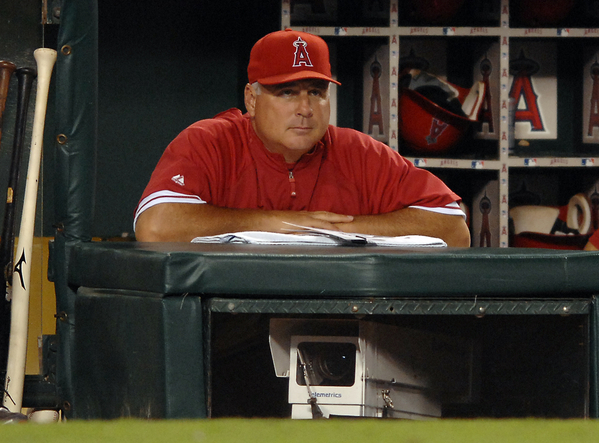Ten upcoming managerial milestones in 2011
Another season is almost upon us, so it’s time to look forward to what the new year might bring. Like all years, the new season promises to give us a number of milestones to look forward to. The most obvious of these is Derek Jeter’s run for 3,000 hits, but many more career achievements will be attained this year.
While most milestones focus on players, some memorable ones will be realized by managers. This is a specialty of mine. I did, after all, write an entire book, “Evaluating Baseball’s Managers,” about them.
So what are the most important milestones that you can expect to see achieved by MLB managers in 2011? Well, let’s see…
1. Look out John McGraw, here comes Tony LaRussa
Tony LaRussa has lasted long enough that he’s finally started to accrue career counting stats comparable to John McGraw. That’s amazing. For the last 80 years, Connie Mack and John McGraw topped all the skipper career stats, and a giant gulf separated them from all (non-)challengers. (To be fair, an even larger gulf detaches Mack from McGraw.)
 |
| LaRussa keeps running out there, year after year. |
That chasm closed in late 2009, when LaRussa managed his 4,770th game, one more than McGraw. Obviously, playing in a 162-game schedule gave LaRussa an advantage over McGraw and his 154-game schedule.
But this year, LaRussa should pass McGraw in another milestone, one that season length doesn’t affect. When Tony LaRussa fills out the lineup card on opening day 2011, it will mark the 33rd consecutive season he’s managed a MLB game.
Only Connie Mack managed more consecutive years. McGraw? He had 32. Here’s a leaderboard for most consecutive seasons managed:
Years Managers 50 Connie Mack 32 John McGraw 32 Tony LaRussa 26 Sparky Anderson 23 Harry Wright 23 Gene Mauch 23 Walter Alston 21 Bobby Cox 21 Joe Torre 21 Joe McCarthy 21 Tommy Lasorda 20 Bucky Harris 20 Clark Griffith 20 Cap Anson
This might sound like an odd thing to keep track of, but it’s a very impressive list to top. A manager has to be highly respected and highly effective for a prolonged period of time. It also takes a lot of stamina. Managing doesn’t take a lot of physical exertion, but it does take tremendous mental concentration and focus.
LaRussa had one of my favorite quotes in managerial history. When asked a few years ago if he still had the verve for the job, he said he did because there are still times “when you’ve got a five-run lead, when it’s tense and I can’t swallow. I’ve got a headache, and I’m afraid I’m going to throw up. You can only feel that stuff because you’re anxious about the outcome.” (In the 2008 THT Annual, author Brian Gunn noted of this quote: “Headaches, anxiety, vomiting—to LaRussa these are sure signs of a healthy work environment.”)
So, yeah, it takes some doing to stay at the job for as long as LaRussa has without a year off. In fact, he missed less than a month in all that time. LaRussa managed his last game for the White Sox on June 19, 1986 and his first for the A’s on July 7. It’s less than three weeks, but it’s his only break in the entire period.
McGraw missed more games than that, departing for portions of the 1924, 1925, and 1927 seasons for brief spells. Mack took two extended sabbaticals in the 1930s. (In Mack’s case, he managed over 33 seasons before he missed a single game, though.)
For LaRussa, the big passing of McGraw won’t happen until 2012. Sometime that season he should usurp McGraw on the all-time win leaderboard. Currently, he’s just 125 wins shy. Stay tuned for that one.
2. The greatest managerial rivalry of our times
Mark September 3, 2011 on your calendar, everybody. Barring rainouts, that will mark the 200th time that LaRussa and Dusty Baker face each other in the regular season. It’ll be the first time in over a quarter century that a pair of managers has ever reached the 200-game marker.
Managers used to square off against each other a lot more often than they currently do. In the old days, teams played 22 games a season against all other teams in the league, so if two skippers existed in the same league for just a decade, they’d face each other over 200 times. This happened numerous times. Longtime AL stalwarts Mack and Bucky Harris faced each other 453 times.
Then came expansion. And divisional play. And more expansion. And interleague play. And, well, managers don’t face each other as often as they used to. Oh, they can still pile up a load of games if they’re in the same division for an extended period of time, but most divisions only have five teams, whereas back in the Mack-Harris days there were eight teams per league.
Only one pair of managers faced each other 200 times in the divisional era, Chuck Tanner and Dick Williams, who faced each other 217 times. (A few other pairs of managers hit the 200 plateau during divisional play, but most of their games took place before divisions. This is the case for Danny Murtaugh and Walter Alston, for example.)
The Baker-LaRussa rivalry is better than the Tanner-Williams one. Baker and LaRussa just plain don’t like each other. Their teams don’t like each other, either, as evidenced by last year’s Reds-Cardinals brawl. The two squads battled for the division crown last season and spent most of the offseason expecting to fight for it again this year. (Though Adam Wainwright’s injury may change that around). It’s perfect that Baker and LaRussa have gone toe-to-toe so often.
3. Jim Leyland and the road to Cooperstown
When Detroit wins its seventh game of the year, Jim Leyland will move into exclusive company: the 1,500 win club. He’ll be member No. 19. Of the other members, 11 are Hall of Fame managers, a 12th (Fred Clarke) is a Hall of Fame player, three more are shoe-ins for induction when they become eligible, and a fourth (Lou Piniella) might make it.
That said, it wouldn’t guarantee Leyland a Cooperstown plaque. He’s already a member of an even more exclusive club: the 1,500 loss club, with sixteen members. Only three current members of the 1,500 win club have losing career records. Two are in Cooperstown, but both won over 2,000 games (Mack and Harris). For perspective, here were the career W-L records of all 18 men the day they won their 1,500th game:
Record Manager 1,500-917 Joe McCarthy 1,500-1,021 John McGraw 1-500-1,066 Fred Clarke 1,500-1,115 Sparky Anderson 1,500-1,194 Bobby Cox 1,500-1,210 Walter Alston 1,500-1,250 Leo Durocher 1,500-1,263 Casey Stengel 1,500-1,287 Connie Mack 1,500-1,321 Bill McKechnie 1,500-1,358 Tommy Lasorda 1,500-1,363 Tony LaRussa 1,500-1,366 Dick Williams 1,500-1,398 Lou Piniella 1,500-1,414 Joe Torre 1,500-1,416 Ralph Houk 1,493-1,518 Jim Leyland 1,500-1,562 Bucky Harris 1,500-1,676 Gene Mauch
Jim Leyland is 1,493-1,518, putting him by the bottom. Will he really last as long as Bucky Harris did?
Ranked by Bill James’ Fibonacci Win Points—wins times winning percentage and then plus wins over/under .500; meant for pitchers, it’s designed to combined wins and winning percentage in one stat—Leyland ranks 41st all-time, just below Mike Scioscia.

Old man Leyland in the dugout.
4. The 1,000 win club
Several managers should break the 1,000 win barrier this year. It’s not nearly as prestigious as the 1,500 win club, but it’s still a nice marker that only 55 skippers have ever achieved. This year Scioscia (980) and Terry Francona (939) should get there. If Buck Showalter (916) can pilot the O’s to their first winning season in memory, he’ll also join the club.
For perspective, here are the records at the 1,000-game marker for every manager who joined this club in the last fifty years (and I’ll include Scioscia, Francona, and Showalter based on their current winning percentages):
Record Manager 1,000-682 Al Lopez 1,000-686 Earl Weaver 1,000-711 Sparky Anderson 1,000-740 Davey Johnson 1,000-754 Walter Alston 1,000-814 Billy Martin 980-802 Mike Scioscia 1,000-835 Red Schoendienst 1,000-845 Tony LaRussa 1,000-848 Dusty Baker 1,000-856 Whitey Herzog 1,000-858 Tommy Lasorda 1,000-860 Danny Murtaugh 1,000-869 Ralph Houk 1,000-884 Bobby Cox 1,000-885 Dick Williams 939-843 Terry Francona 1,000-925 Jack McKeon 1,000-926 Lou Piniella 1,000-927 Chuck Tanner 916-856 Buck Showalter 1,000-958 Bobby Valentine 1,000-963 Art Howe 1,000-967 Charlie Dressen 1,000-967 Mike Hargrove 1,000-976 Felipe Alou 1,000-1,038 Bruce Bochy 1,000-1,044 Jim Leyland 1,000-1,064 Jim Fregosi 1,000-1,073 Bill Rigney 1,000-1,076 John McNamara 1,000-1,086 Joe Torre 1,000-1,095 Frank Robinson 1,000-1,144 Gene Mauch
Scioscia and Francona could end up in Cooperstown if the rest of their careers go well.

Scioscia: he’s had quite a start to his career.
5. 100 games over .500
Currently, 43 managers have their career win-loss record at least 100 games over .500. If the Red Sox go 83-79 or better, Francona will be the 44th manager. You have to like his odds to do that. Not bad for a guy who was once 79 games under .500.
In other news, LaRussa can crack the top ten all-time in games over .500 if the Cards finish four games over .500. Wainwright’s injury might make that uncertain, but then again, LaRussa and his pitching coach Dave Duncan have the knack to turn things around when not expected to.
6. Jim Riggleman and the wrong end of the spectrum
While LaRussa might make the top ten all time in wins over .500, Jim Riggleman might make the bottom ten. He’s currently 11th-worst, at 163 games under .500 (624-787). Tenth-worst is former St. Louis Browns skipper Zach Taylor at 175 games under (235-410). Given that Riggleman manages the Nationals, he has an excellent shot to pass Taylor.
This really isn’t an insult to Riggleman, though. Roger Craig once said it takes a heckuva pitcher to lose 20 games in a season. If you were no good, they wouldn’t keep trotting you out. Riggleman isn’t the second coming of McGraw, but his record is so bad because his teams have been putrid.
7. Finally, an up arrow in Tampa
As we move along, these things get less important. From here on out, we’re looking more at team-based milestones to fill out the list.
Currently, no manager has ever posted a winning record during his overall tenure with the Tampa Bay Rays. Given their complete lack of success in the club’s first decade, that’s not even remotely surprising. However, Joe Maddon should end that trend this year. He’s 404-406 with the Rays, and they’re a good bet to win at least 83 games this year. (As it happens, Maddon’s career record is over .500, but that’s because he had some interim stints at the helm with the Angels.)
8. Moving up San Diego’s leaderboard
The San Diego Padres have been around over 40 years and nearly 7,000 games, but they’ve only had one man (Bruce Bochy) last more than four years running their squad. That’s a rather impressive turnover rate.
This is only worth noting because current skipper Bud Black will start his fifth season running the club on opening day. Currently, he’s been in charge of the team for 649 games, just as many as Dick Williams did back in the 1980s. Sometime in May, Black should pass up Williams for second all-time on the club’s winningest manager list as well.
9. Moving up Philadelphia’s leaderboard
Moving up San Diego’s leaders is a nice achievement, but they’re ultimately just an expansion team. The Phillies? They go back to the Chester A. Arthur administration. Admittedly, they’re the most historically inept of the pre-expansion franchises (the only one with 10,000 losses), but they still have over 125 years of history.
Charlie Manuel is reaching the rarified air of Philies managers. This year, he’ll become the fourth manager to helm the club for 1,000 games, and should end the season third in games; second most since 1900 (19th century Hall of Famer Harry Wright and Gene Mauch are the two who will still top of Manuel by the end of 2011.)
Manuel might move even higher on the wins list. His 544 wins put him fourth in franchise history, but he’s only 50 wins behind Danny Ozark. In fact, he’s only 92 games behind Wright in second place, and the club has won at least 92 games each of the last three years. There’s a non-zero chance Manuel can end the year in first place, as Gene Mauch leads him by 102 wins. Expecting to get that many wins isn’t likely, but it is possible.
10. Dusty and Cincinnati
This last one is less a milestone than it’s something I found surprising. Dusty Baker has only managed the Reds for three years, but he’s already moved up the team leaderboard fairly well. In fact, in June he’ll have lasted longer with the club than Jack McKeon did. Why is that important? Well, it means that Baker will have lasted with the Reds longer than any manager since Pete Rose, whom baseball banned over 20 years ago.
That’s an impressive level of managerial turnover. In over 20 years, the club hasn’t had someone last four full seasons. That’s not unprecedented, but it certainly isn’t usual. If Baker makes it to the end of 2012, he’ll be the fifth man to log 800 games with the Reds, and the first since Sparky Anderson over 30 years ago.
You forgot Tom Kelly on the “1000 Wins” breakdown list – who would have had maybe 1100 loses when he hit 1000 wins. Doesn’t affect anything – just a point.
Ctwink—Good catch. I knew I missed one of them, but didn’t know who.
You might have mentioned it elsewhere but Dusty’s last manager, with the ‘86 A’s, was LaRussa. Baker wasn’t that good that year and it is not obvious that his playing time went down when LaRussa came in.
gdc – Nice. I didn’t notice that. Thanks for the info.
Obviously, playing in a 162-game schedule gave LaRussa an advantage over McGraw and his 154-game schedule.
OTOH, managers often get abruptly fired midseason. Ballplayers don’t. LaRussa’s earned whatever longevity records he’s approaching.